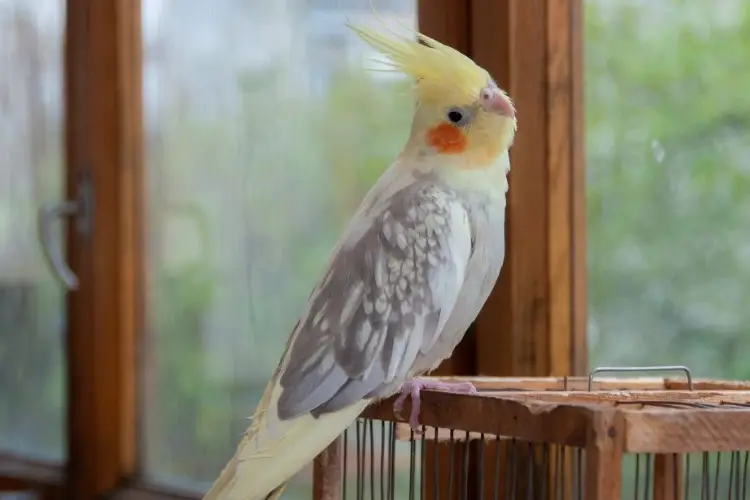After a few months of owning a cockatiel, you may notice fallen feathers around its cage. It can be frightening because feathers are essential in keeping your cockatiel warm. However, do not worry; it is not always bad when cockatiels lose their feathers.
So, why is my cockatiel losing feathers? The primary cause of feather loss in cockatiels is molting. Molting is a natural process that occurs twice a year. Stress, poor nutrition, excessive preening, and abnormal molting may also contribute to this condition. Ensure you determine why the cockatiel is losing its feathers and take the necessary steps to help it regrow them.
Let’s take a deeper look at why your cockatiel is losing its feathers. In addition, we will also examine.
Why Is My Cockatiel Losing Feathers?
There are multiple causes for your cockatiel’s feather loss. Some causes are not severe, and you should not be concerned. However, some reasons for a cockatiel feather problem may be due to a bacterial or viral infection.
I will describe all the symptoms and signs you should be on the lookout for. Here are the causes for your cockatiel’s feather loss.
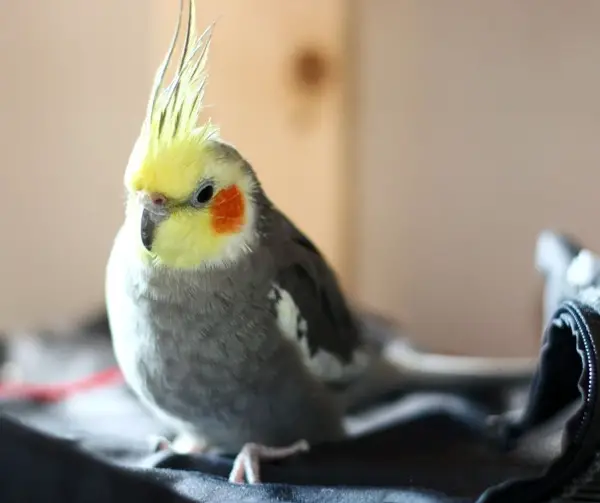
Molting
When a bird molts, it sheds its feathers to grow new ones. It is a natural process that occurs right after the nesting season or before the cockatiels migrate. It primarily happens in captivity during the summer months. Molting begins when a cockatiel is six to twelve months old.
It can happen all year, but heavy molting only occurs twice yearly. When cockatiels molt, they are in significant discomfort and expend energy.
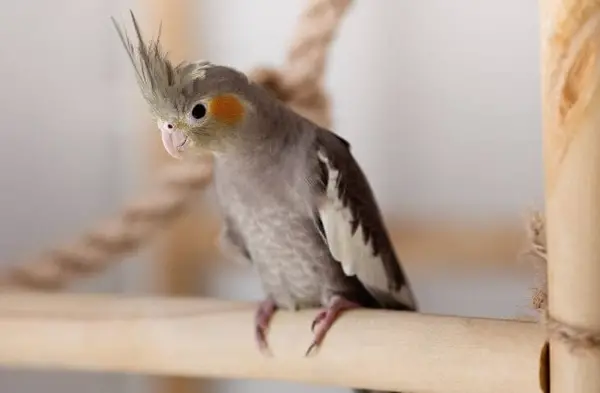
If the cockatiel’s feather loss is due to molting, you will notice pin feathers where the fallen feathers were. If your cockatiel continues to lose feathers after molting, there is another underlying problem.
Cockatiel feather problems
Most feather issues are caused by viruses like polyoma and bacteria like Staphylococcus. The most common cause of feather loss is psittacine beak and feather disease.
Aside from feather loss, your bird may have beak abnormalities. Isolate your bird from the rest and have it vaccinated by a veterinarian if it has the psittacine disease.
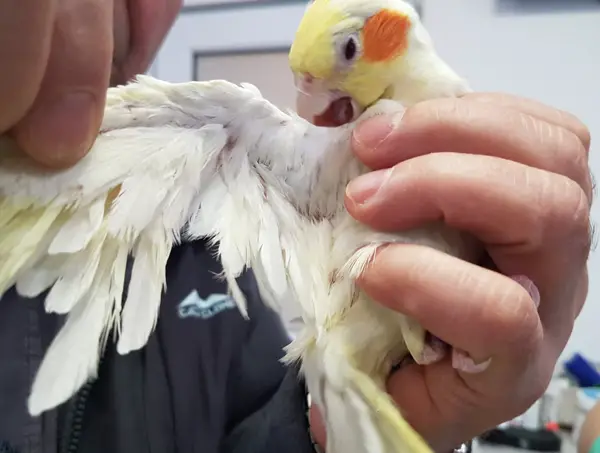
Other cockatiel feather problems include feather cysts and frayed feathers. Feather cysts develop when a feather fails to emerge from its follicle. Uneven distribution of feather hairs characterizes frayed feathers.
It is primarily caused by mineral deficiency. Both conditions cause itching and skin irritation, resulting in feather plucking.
Excessive preening
Normal cockatiel behavior includes the bird preening its feathers and grooming its beak. Excessive preening, on the other hand, indicates that your cockatiel is ill.
It could be caused by a skin infection such as scabies, itchy eczema, or skin lesions. Cockatiel skin infections cause itching, causing the bird to pluck its feathers to relieve the itch.
Another reason cockatiels may pluck their feathers is heavy metal poisoning. Cockatiels frequently bite their cages, as any attentive bird owner will notice.
These cages are frequently painted with paint that contains traces of zinc or lead. The cockatiel body cannot digest these metals, leading to serious health problems, including feather plucking.
Feather plucking may also be due to psychological issues. Cockatiels are typically social animals that live in large groups, even in the wild. So, if your cockatiel lacks social interaction, it will become bored and develop emotional distress, leading to excessive feather plucking.
Parasites
Cockatiels are frequently infested with mites, lice, and fleas. If there are a lot of these parasites, they will suck the cockatiel’s blood, making the cockatiel’s skin itchy. To alleviate the itch, the cockatiel will constantly pluck its feathers, resulting in feather loss. Check if the cockatiel has diarrhea, a common symptom of fungal or parasitic infections.
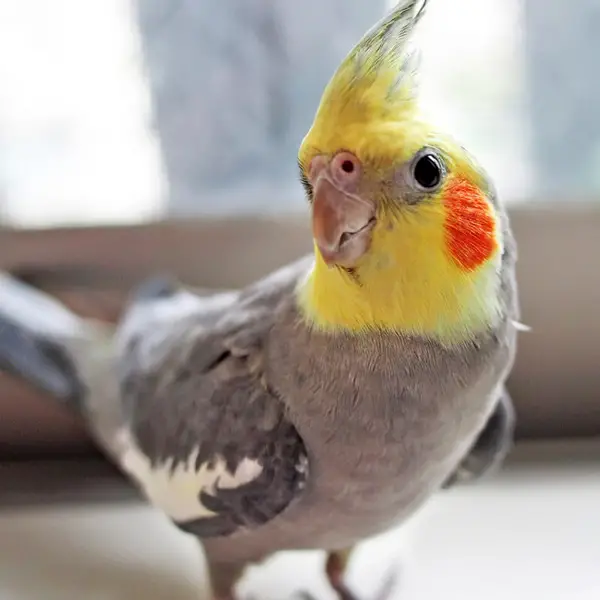
Stress
Cockatiels are sensitive birds that can be stressed by changes in diet and routine, fear or anxiety, and room temperature and lighting. An anxious cockatiel will mutilate itself to divert its attention away from the stress trigger.
Cockatiels may also begin feather plucking if the environment in which they live changes. If the temperature in the room rises, the cockatiel will pluck its feathers in an attempt to regulate its body temperature.
If the cockatiel doesn’t get enough rest, it may become stressed and pluck its feathers. Cockatiels require twelve hours of sleep per night.
Why Is My Cockatiel Losing Feathers On The Head?
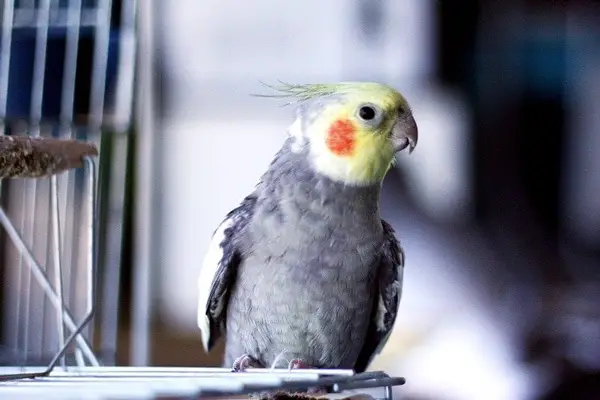
Your cockatiel may begin to lose feathers on its head due to the following reasons:
- Presence of a fungal infection such as ringworm; infections will cause the feathers on the top of the head to fall off.
- Another cagemate may over-preen one of your cockatiels, causing it to lose feathers on the head. Grooming is a natural way for female cockatiels to express their affection for their mates. If it becomes too much, the male bird develops a bald spot on its head.
- It’s also possible that your cockatiel’s head feathers are falling out due to stress or malnutrition. Cockatiels’ reactions to dietary changes can vary. If you must change the diet, gradually allow the cockatiel to adjust.
Also read: Can Cockatiels Eat Bread?
Why Is My Cockatiel Losing Feathers On the Chest?
Molting is most likely the cause of the cockatiel’s loss of feathers on its chest. Molting, as previously stated, is a natural occurrence that occurs twice a year. Cockatiels, like all birds, do not repair their feathers; instead, they replace them.
The bird may, however, undergo abnormal molting, primarily influenced by the environment. A cockatiel, for example, may remain in molting due to insufficient lighting and excessive heat. If the conditions do not change, the cockatiel will continue to molt.
If your cockatiel isn’t molting, it could be over-grooming. Excessive feather loss, hair follicle damage, inflammation, sores, and baldness can all result. Furthermore, if the cockatiel has an infection or skin disease on its chest, it will shed many feathers.
Why Is My Cockatiel Losing Tail Feathers?
Cockatiels lose their tail feathers during molting seasons but don’t worry. During the molting process, your cockatiel sheds old feathers, and new feathers appear to replace the old ones. However, if you notice your cockatiel plucking its tail feathers on its own, there must be a problem.
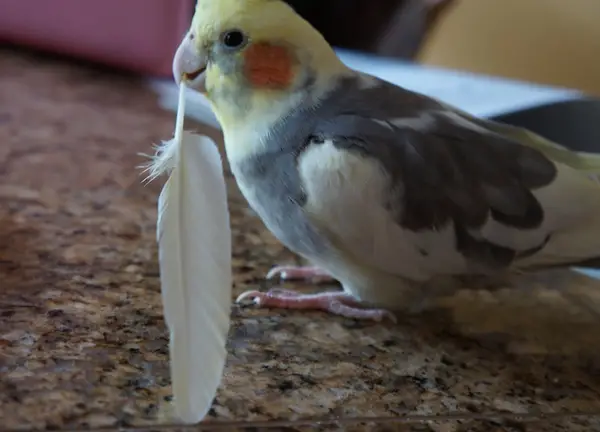
If your cockatiel is losing feathers, but its replacement feathers haven’t fully matured, or if it’s due to sickness, it should be treated. This could be due to a lack of a suitable environment, or it could be due to malnutrition, in which your pet is not getting enough nutrients in its current diet.
Do Cockatiel Feathers Grow Back?
Yes, feathers do regrow. Following molting, old feathers are replaced by new blood feathers. It takes at least three weeks for the blood feathers to form. The entire molting process can last up to 11 weeks.
The first step in the process of producing new feathers is the formation of feather follicles. The new feathers will then emerge from the feather follicles. Bird feathers are essential for survival. They not only keep the bird warm but also help it fly.
It can take up to a year for a new feather to form fully. The rate of feather formation is also affected by the weather and the severity of the injury.
How Can I Help A Cockatiel From Losing Its Feathers?
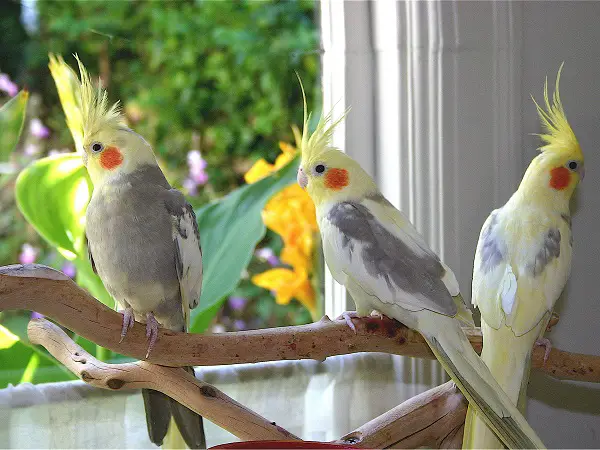
Here are some ways to help your cockatiel if it is losing its feathers.
- Molting or feather loss is a highly energy-intensive process. To compensate for lost energy, you must feed the cockatiel more food, i.e., increase the cockatiel’s diet by 25%.
- If an infection causes feather loss, take the cockatiel to a veterinarian, who will prescribe the appropriate medication. The veterinarian will also check for and remove parasites on the cockatiel.
- Ensure the cockatiel is kept in a room with an ideal temperature of 70-80°F (21-27°C). Also, provide enough lighting for the cockatiel to avoid constant molting.
- Cockatiels pluck their feathers to reduce heat during hot seasons. You can avoid this by misting the cockatiel’s feathers or giving it a water bath.
- Spend time with your cockatiel to relieve stress. If you are not always available, you can add another cockatiel.
- Purchase an aluminum or steel cage to reduce metal poisoning. Because these cages are not painted, your bird will not ingest toxins even if it bites the cage.
- In addition to the regular diet, fresh fruits and vegetables will promote feather growth. Fruits and vegetables provide vitamins A, D, and E to cockatiels.
Vitamin A aids in the production of keratin, which is required in the feather-making process. Vitamin C promotes calcium synthesis, which strengthens bones and feathers.
FAQs
Here are other questions cockatiel owners want to know about their birds losing feathers.
Yes, plucked feathers regrow. A blood clot will form where feather follicles will create a new feather shaft due to the injury. This process, however, is not always successful; some feathers may regrow with abnormalities such as being shorter or rougher.
The number of fallen feathers is the primary distinction between molting and plucking by a cockatiel. A cockatiel will lose a few feathers at a time when molting. If you notice a lot of feathers in the cage, the cockatiel may be plucking them.
Related: Cockatiel Mating Behavior
Conclusion
Cockatiels lose their feathers due to molting, an infection or parasite, feather plucking, and stress. Molting is normal, and you should not be concerned. To solve most cockatiel feather problems, ensure the cockatiel has the proper diet and environment and remove any stress triggers.
